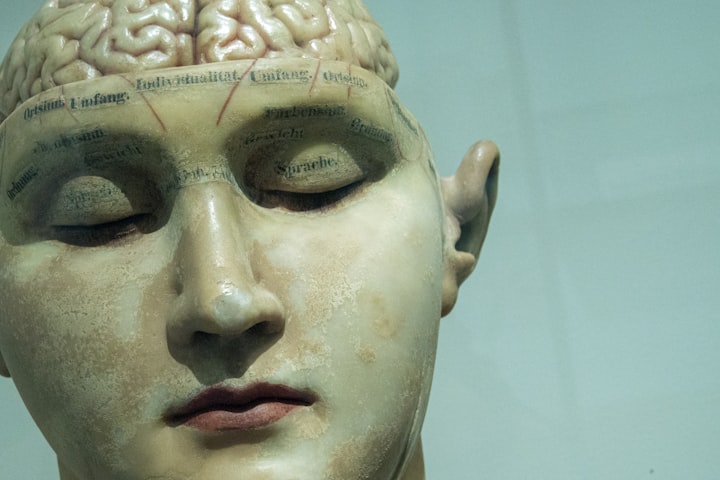Concussion? I'm Gonna Tell You What Your ER Doc Won't
That concussion protocol list just isn't enough

You’ve had a concussion.
Conked your cranium.
Bonked your brain.
Knocked your noggin.
Beaned your bean.
Shaken your shell.
Now it’s time to heal.
You’ve taken the first step. Here you are, at the hospital. Let’s pretend I’m your ER doctor. I’m going to check your eyes, your ears, your neck, your head…and I’m going to decide if you need an x-ray or a CT scan or stitches or hospital admittance. No brain bleed? Good.
I’m going to send you home with a list of things you should, can, shouldn’t and can’t do.
And I’ll advise you to check out ‘what to do after a concussion’ on the Internet.
Because the Internet is exactly the place you should hang out after a concussion. And I should know better than to tell you that. But it’s an easy way for me to get you in and out of the ER as quickly as possible. Do you get the impression that I feel a little silly telling you to avoid technology but encouraging you to do your own research on the internet?
There are things you need to know, but you’re not likely to learn them here. So I’ll give you a quick rundown to help you get through the next couple of weeks or so, and then the healing is in your hands. Because people who have sustained brain injuries are really awesome at self-care. Again, sorry for the sarcasm. But I am trying to help.
Are you picking up my sense of frustration? I have a short visit with you, but I’m a doctor, and I care about healing people. I just don’t have the time or the resources to fix you.
So, here goes. These are tried and true concussion protocols.
First, sleep. The old adage that you need to stay awake for 24 hours after a concussion is old hat. Nope, not necessary. In fact, your brain needs to rest. So go home. Go to bed. Or grab a blankie and curl up with a nice cuppa milky, sugary tea (oh thanks, Ontie Brender) and let yourself doze.
Make sure you eat, and drink lots of water. If you are nauseated, try eating digestive cookies, apple sauce, or whatever you can keep down. Avoid spicy or fatty foods. Oatmeal is also a good choice.
Your brain needs to take a little stimulation siesta, because a brain heals best when it’s at rest.
This means no computers, no smart phones, no TV, no Netflix. Sorry. But avoiding technology for a few days (maybe 48-72 hours) gives your brain some downtime. Remember, your brain controls your senses—and it takes a lot of management effort to distill what’s on the screen. That’s why you may find that watching TV or going to a movie (or using your phone or your tablet for visuals) may make you tired or frustrated or nauseated for a while afterwards.
If your head is aching (and I’m sure it will) take a pain-reliever with acetaminophen (Tylenol). Avoid ibuprofen (Advil) and aspirin as they can contribute to excessive bleeding. I didn’t know about the Advil and while I didn’t have a brain bleed, I did have a lot of facial bleeding! And don’t use alcohol to numb the pain. Alcohol can slow the healing process and exacerbate your emotional frustrations. Trust me, you’re already going to feel rough enough…you don’t need to be more wobbly and hungover than your concussion makes you!
So…I know you need to go to work or school. Or you need to get into the roster for the next game. Well, actually, you don’t. Major presentation time? Forget it. It sounds incredible, but your work, school and sports worlds can continue on without your imperative input. Your colleagues, your bosses, your teachers and your team are beginning to understand the impact (ha, that’s a pun) of concussion and mild traumatic brain injury.
Driving? I don’t recommend it. Your reflexes may be a little off, your reaction time is likely a little (or a lot) slower, and your vision might not be back to normal. If you must go to work within 72 hours of your accident, and you’re feeling up to it, consider taking public transit or asking a friend or relative for a ride.
After your 48-hour non-negotiable rest, you can gradually begin experimenting with your daily routine. Like the aforementioned work. I understand that you may not have paid sick days or you’re paid by the hour. I get that. But I cannot stress the importance of rest. So please, if you must go to work, please advise your supervisors that you have experienced a concussion.
Now, here comes the serious bit—the stuff I don’t have time or maybe even the knowledge to share with you. See, because what I’m about to tell you is what you need to know as you carry on with your life after mild traumatic brain injury.
Keep in mind that many people who sustain a concussion heal within several weeks or several months. Others don’t. This is what we don’t share with you. Now of course, I can’t tell you absolutely everything, because each brain injury and each brain injury sufferer is different. You, my patient patient, are unique. But here goes:
You may get frustrated.
You may get confused.
You may find it difficult to pay attention.
You may have ongoing pain, and not necessarily in your head.
You may experience significant mood swings.
You may forget things.
You may have unusual emotional reactions.
You may feel paranoid.
Your self-esteem and confidence may take a hit.
You may argue more.
Your family may wonder who the heck replaced you.
Your friends may not understand.
You may start to avoid social activities.
You’ll need earplugs at concerts and loud public events.
Your ears may start ringing—and they won’t stop.
Your hearing may be affected.
You’ll be overwhelmed in large crowds.
You’ll be extremely exhausted after social events.
Extra brain work requires extra sleep.
Doctors may not understand the link between depression, anxiety, and brain injury. It’s easy to prescribe medication for depression, but docs sometimes hesitate to link mental health issues or mood disorders with concussion. So many of us have been told we're suffering depression and anxiety, but there's no mention that those mood disorders may result from your headbanging.
You may have feelings of self-harm and suicide.
You may have post-traumatic stress disorder (PTSD) resulting from your incident.
Ten years after my most serious concussion, I still find myself needing extra sleep when my brain has worked hard at a complex task, or when I’ve been socializing more than usual. Especially during the holiday season, I must be careful to pace myself and take regular ‘quiet’ time. That means self-care in the form of no TV, no computer. Instead, I might go for a walk in the fresh winter air. Nature helps.
Oh, and as my friends remind me, wear a helmet.
About the Creator
Catherine Kenwell
I live with a broken brain and PTSD--but that doesn't stop me! I'm an author, artist, and qualified mediator who loves life's detours.
I co-authored NOT CANCELLED: Canadian Kindness in the Face of COVID-19. I also publish horror stories.






Comments
There are no comments for this story
Be the first to respond and start the conversation.